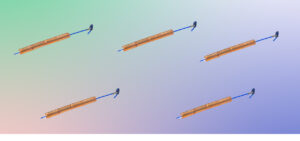by The Lowdown
Reviewed by Dr. Melanie Davis-Hall on May 24, 2023

Is Microgynon safe for breastfeeding mothers?
In the first 6 weeks following childbirth, you are at an increased risk of experiencing a blood clot in the legs or lungs compared to other times in your life.
The combined pill also slightly increases your risk of a blood clot and therefore it is recommended that you do not use this in the first 6 weeks following childbirth. Your risk of blood clots related to your recent pregnancy reduces over time and therefore it is safe to start the combined pill once you reach 6 weeks post pregnancy if you are breastfeeding.
If you are not breastfeeding you may be able to start a combined pill from 3 weeks post pregnancy (if you have no other medical problems which increase your risk of a blood clot).
When taking a combined pill, like Microgynon, this does have some small risks associated with it, irrespective of whether you have recently been pregnant or not.
There continues to be a slight increased risk of blood clots when you take the combined pill after 6 weeks post-pregnancy and it also slightly increases your risk of breast cancer and cervical cancer. There is also a chance it could increase your blood pressure.
All of these risks are very small if you are otherwise fit and healthy, are a healthy weight, maintain a healthy diet, do not smoke or drink excessive alcohol and do not have any other medical problems or risks.
It is always best to discuss your individual case with a healthcare professional however so that your risk can be adequately assessed. When you order the combined pill through us at The Lowdown you’ll be asked to complete a short questionnaire which is reviewed by our pharmacists to assess your individual risk.
Does Microgynon affect milk supply?
There is no strong medical evidence to suggest that Microgynon affects breast milk supply.
Lots of research has been done on this topic and the conclusion is that there has not been any research that has consistently demonstrated that Microgynon (or other combined pills) negatively impact a breastfed baby’s growth or the ability of the mother to continue breastfeeding.
This suggests that even if the milk supply is affected by taking Microgynon, it is not enough to have an effect on the baby. Usually your milk supply will have been well established by 6 weeks into your breastfeeding journey and therefore it is unlikely to be lowered by the hormone content of the Microgynon pill.
Despite the medical evidence however – some women do report a change in their supply when taking Microgynon. Therefore it should not be dismissed as completely impossible.
You should consider this as a potential possibility when deciding whether or not to take the Microgynon pill, especially if you already have some problems with breast milk supply.
What other methods of contraception can you take while breastfeeding?

Most methods of contraception are available to you when breastfeeding. You may not require any additional contraception if you meet certain criteria when breastfeeding:
- You are fully breastfeeding day and night (you are not giving your baby any other liquid or solid food) AND
- Your baby is less than six months old AND
- You have no periods
This method (known as lactational amenorrhoea) is considered to be over 98% effective at preventing pregnancy.
If you do not meet the above criteria, or you would prefer some additional contraception, there are several other options:
- Progestogen-only pill
- Contraceptive injection
- Contraceptive implant
- Hormonal intrauterine device (aka hormonal coil or IUS)
- Non-hormonal intrauterine device (aka copper coil or copper IUD)
- Combined hormonal contraceptive vaginal ring and patch
- Barrier methods such as condoms or the contraceptive diaphragm or cap

Most of these methods can be started immediately following childbirth (apart from combined methods), but your individual case and eligibility should be discussed with a healthcare professional.
If you are considering a coil, also known as an IntraUterine Device (IUD) this would usually need to be fitted either within 48 hours of childbirth or after 4 weeks post childbirth, due to the risk of damage to the womb.
When you are breastfeeding there is a higher chance of perforation (making a hole in the lining of your womb) when having a coil fitted. The risk is still very low, but you should be made aware that breastfeeding does increase this risk slightly. IUDs are extremely effective methods of contraception however and should not be dismissed for this reason alone.
Check out our contraceptive pages and reviews for more information on each of these methods!










